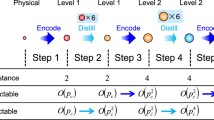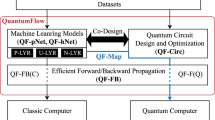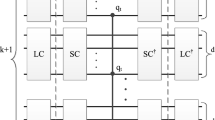Abstract
How to design a universal fault-tolerant quantum computation protocol with high fidelity and low resource consumption is a hot topic in the field of quantum computing research. By reducing the effective code distance, the design of a universal fault-tolerant gate set based on concatenation code has been proposed. The auxiliary state required by the error correction of code must be verified before it can be used, so as to avoid the errors spread from the auxiliary state to the data state. But the qubit consumption can be very large due to multiple verification processes for the ancillary block. In this work, we analyze the ancillary consumption of two different verification schemes used in the Steane’s error correction process. We take the basic state preparation of a 25-qubit 2-level concatenation code as an example, adopt a simpler verification circuit in its error correction process, and design an efficient decoding strategy by using deep neural network algorithm. Numerical simulations are also performed to analyze our low qubit resource overhead error correction scheme.







Similar content being viewed by others
References
Gottesman, D., Lo, H.-K., Lutkenhaus, N., Preskill, J.: Security of quantum key distribution with imperfect devices. In: International symposium on information theory, 2004. ISIT 2004. Proceedings., pp 136. IEEE (2004)
Lanyon, B.P., Whitfield, J.D., Gillett, G.G., Goggin, M.E., Almeida, M.P., Kassal, I., Biamonte, J.D., Mohseni, M., Powell, B.J., Barbieri, M., et al.: Towards quantum chemistry on a quantum computer. Nature chemistry 2(2), 106–111 (2010)
Baireuther, P., Caio, M.D., Criger, B., Beenakker, C.W.J, O’Brien, T.E.: Neural network decoder for topological color codes with circuit level noise. New J. Phys. 21(1), 013003 (2019)
Biamonte, J., Wittek, P., Pancotti, N., Rebentrost, P., Wiebe, N., Lloyd, S.: Quantum machine learning. Nature 549(7671), 195–202 (2017)
Preskill, J.: Quantum computing in the nisq era and beyond. Quantum 2, 79 (2018)
Neill, C., Roushan, P., Kechedzhi, K., Boixo, S., Isakov, S.V., Smelyanskiy, V., Megrant, A., Chiaro, B., Dunsworth, A., Arya, K., et al.: :a blueprint for demonstrating quantum supremacy with superconducting qubits. Science 360(6385), 195–199 (2018)
Häffner, H., Roos, C.F., Blatt, R.: Quantum computing with trapped ions. Physics reports 469(4), 155–203 (2008)
Raussendorf, R., Harrington, J.: Fault-tolerant quantum computation with high threshold in two dimensions. Physical review letters 98(19), 190504 (2007)
Fowler, A.G., Stephens, A.M., Groszkowski, P.: High-threshold universal quantum computation on the surface code. Phys. Rev. A 80(5), 052312 (2009)
Ballance, C.J., Harty, T.P., Linke, N.M., Sepiol, M.A., Lucas, D.M.: High-fidelity quantum logic gates using trapped-ion hyperfine qubits. Phys. Rev. Lett. 117, 060504 (2016). https://doi.org/10.1103/PhysRevLett.117.060504. https://link.aps.org/doi/10.1103/PhysRevLett.117.060504
Devoret, M.H., Schoelkopf, R.J.: Superconducting circuits for quantum information: an outlook. Science 339(6124), 1169–1174 (2013)
Arute, F., Arya, K., Babbush, R., Bacon, D., Bardin, J.C., Barends, R., Biswas, R., Boixo, S., Brandao, F.G.S.L., Buell, D.A., et al.: Quantum supremacy using a programmable superconducting processor. Nature 574 (7779), 505–510 (2019)
Childs, A.M., Kothari, R., Somma, R.D.: Quantum algorithm for systems of linear equations with exponentially improved dependence on precision. SIAM J. Comput. 46(6), 1920–1950 (2017)
Harrow, A.W., Hassidim, A., Lloyd, S.: Quantum algorithm for linear systems of equations. Physical review letters 103(15), 150502 (2009)
Gottesman, D.: An introduction to quantum error correction and fault-tolerant quantum computation. In: Quantum information science and its contributions to mathematics, Proceedings of Symposia in Applied Mathematics, vol. 68, pp. 13–58 (2010)
Nielsen, M.A., Chuang, I.L.: Quantum computation and quantum information. Cambridge University Press, Cambridge (2000)
Shor, P.W.: Fault-tolerant quantum computation. In: Foundations of computer science, 1996. Proceedings., 37th Annual Symposium on, pp. 56–65. IEEE (1996)
Steane, A.M.: Error correcting codes in quantum theory. Phys. Rev. Lett. 77(5), 793 (1996)
Knill, E., Laflamme, R., Zurek, W.: Accuracy threshold for quantum computation (1996)
Chamberland, C., Jochym-O’Connor, T., Laflamme, R.: Overhead analysis of universal concatenated quantum codes. Phys. Rev. A 95(2), 022313 (2017)
Bacon, D.: Operator quantum error-correcting subsystems for self-correcting quantum memories. Phys. Rev. A 73(1), 012340 (2006)
Aliferis, P., Cross, A.W.: Subsystem fault tolerance with the bacon-shor code. Physical review letters 98(22), 220502 (2007)
Gottesman, D.: Fault-tolerant quantum computation with constant overhead. Quantum Information & Computation 14(15-16), 1338–1372 (2014)
Chao, R., Reichardt, B.W.: Fault-tolerant quantum computation with few qubits. npj Quantum Information 4(1), 42 (2018)
Chamberland, C., Beverland, M.E.: Flag fault-tolerant error correction with arbitrary distance codes. Quantum 2, 53 (2018)
Torlai, G., Melko, R.G.: Neural decoder for topological codes. Phys. Rev. Lett. 119, 030501 (2017). https://doi.org/10.1103/PhysRevLett.119.030501. https://link.aps.org/doi/10.1103/PhysRevLett.119.030501
Baireuther, P., O’Brien, T.E., Tarasinski, B., Beenakker, Carlo WJ: Machine-learning-assisted correction of correlated qubit errors in a topological code. Quantum 2, 48 (2018)
Krastanov, S., Jiang, L.: Deep neural network probabilistic decoder for stabilizer codes. Scientific reports 7(1), 1–7 (2017)
Carleo, G., Cirac, I., Cranmer, K., Daudet, L., Schuld, M., Tishby, N., Vogt-Maranto, L., Zdeborová, L.: Machine learning and the physical sciences. Rev. Mod. Phys. 91(4), 045002 (2019)
Chamberland, C., Ronagh, P.: Deep neural decoders for near term fault-tolerant experiments. Quantum Science and Technology 3(4), 044002 (2018)
Poulin, D.: Optimal and efficient decoding of concatenated quantum block codes. Phys. Rev. A 74(5), 052333 (2006)
Chamberland, C., Jochym-O’Connor, T., Laflamme, R.: Thresholds for universal concatenated quantum codes. Physical review letters 117(1), 010501 (2016)
Gottesman, D.E.: Stabilizer codes and quantum error correction. Ph.D. Thesis, California Institute of Technology (1997)
Jochym-O’Connor, T., Laflamme, R.: Using concatenated quantum codes for universal fault-tolerant quantum gates. Physical review letters 112(1), 010505 (2014)
Nikahd, E., Sedighi, M., Zamani, M.S.: Nonuniform code concatenation for universal fault-tolerant quantum computing. Phys. Rev. A 96(3), 032337 (2017)
Bishop, C.M.: Pattern recognition and machine learning (information science and statistics). Springer-Verlag New York, Inc., New York (2006)
Lecun, Y., Bengio, Y., Hinton, G.: Deep learning. Nature 521 (7553), 436 (2015)
Aaronson, S., Gottesman, D.: Improved simulation of stabilizer circuits. Phys. Rev. A 70(5), 052328 (2004)
Aliferis, P., Gottesman, D., Preskill, J.: Quantum accuracy threshold for concatenated distance-3 codes. Quantum Information & Computation 6(2), 97–165 (2006)
Wecker, D., Svore, K.M.: Liqui| >: A software design architecture and domain-specific language for quantum computing. arXiv:1402.4467 (2014)
Fowler, A.G., Mariantoni, M., Martinis, J.M., Cleland, A.N.: Surface codes: Towards practical large-scale quantum computation. Phys. Rev. A 86(3), 032324 (2012)
Acknowledgements
This work is supported by the National Key R&D Program of China under Grant No. 2018YFA0306703, the National Natural Science Foundation of China under Grant No. 61772006, the Natural Science Foundation of Guangxi under Grant No. 2019GXNSFAA185033, and the Special Fund for Bagui Scholars of Guangxi.
Author information
Authors and Affiliations
Corresponding author
Additional information
Publisher’s Note
Springer Nature remains neutral with regard to jurisdictional claims in published maps and institutional affiliations.
Rights and permissions
About this article
Cite this article
Lin, C., Wang, Y., Wu, J. et al. Efficient Decoding Scheme of Non-Uniform Concatenation Quantum Code with Deep Neural Network. Int J Theor Phys 60, 848–864 (2021). https://doi.org/10.1007/s10773-020-04706-8
Received:
Accepted:
Published:
Issue Date:
DOI: https://doi.org/10.1007/s10773-020-04706-8




